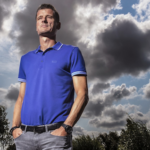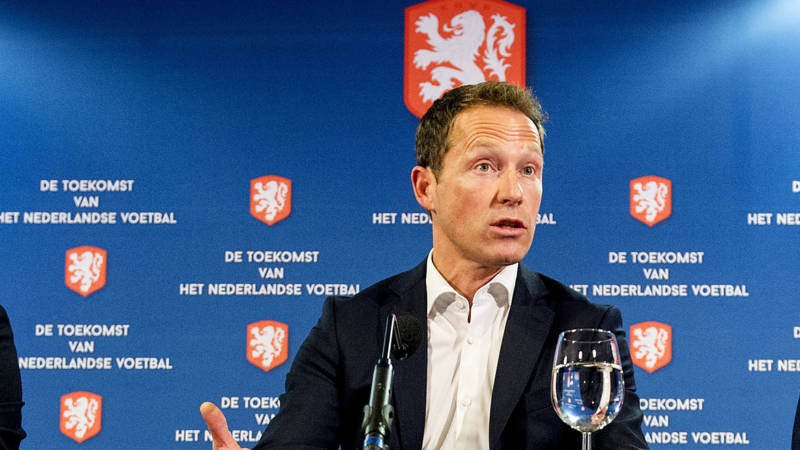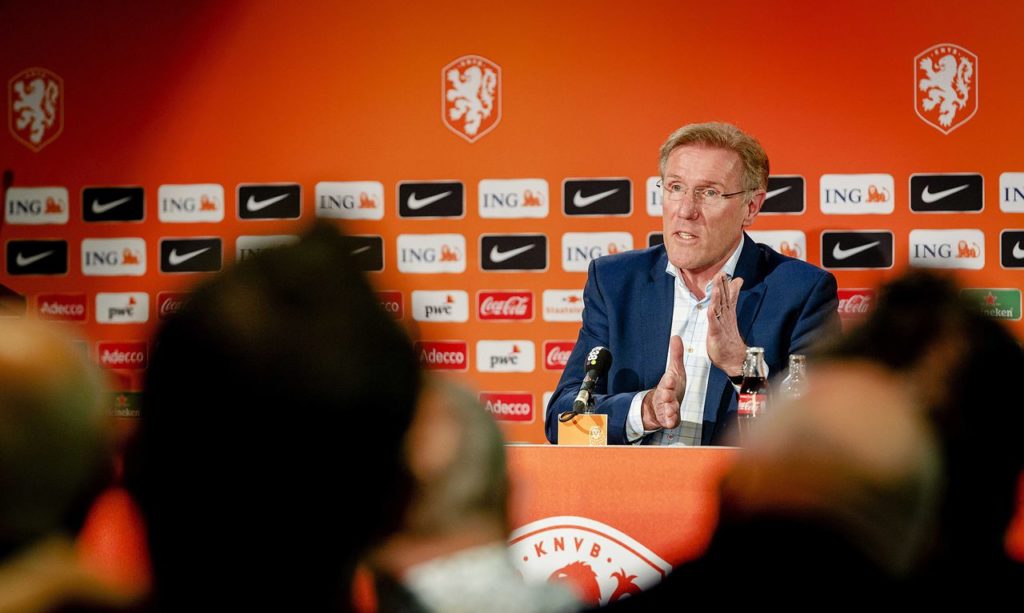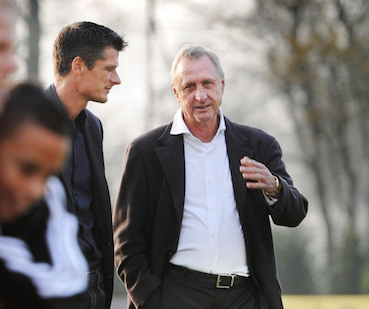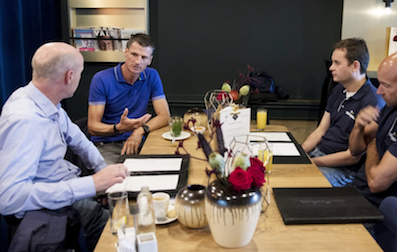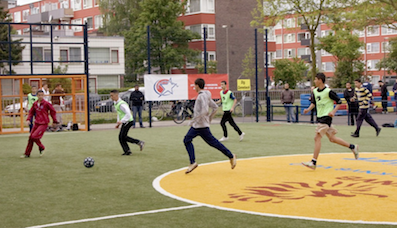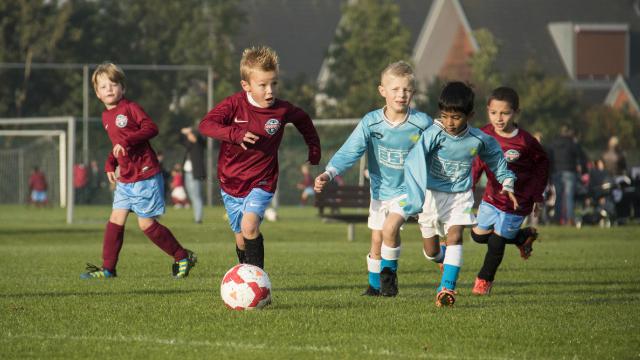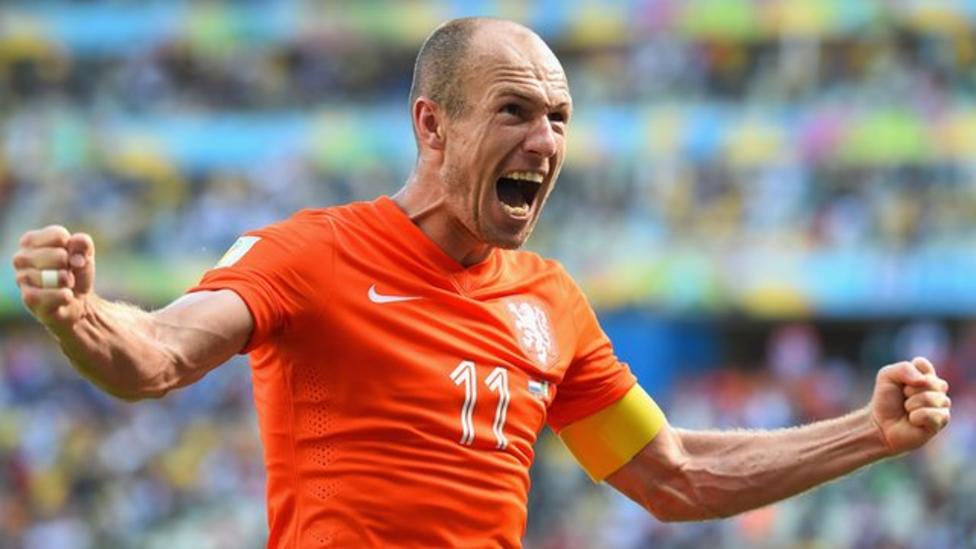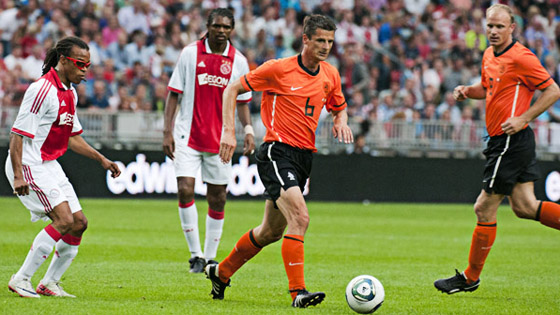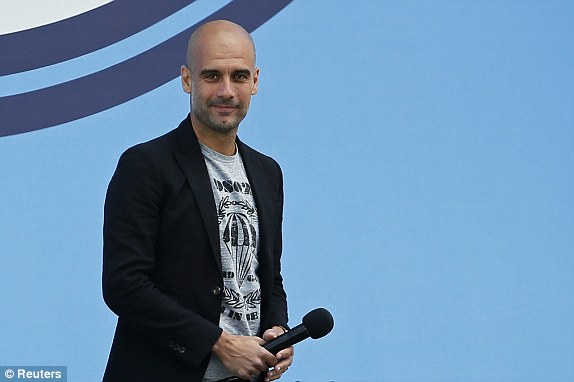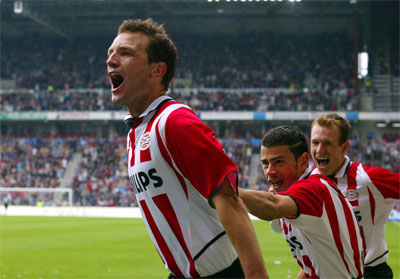Another disappointing weekend for Dutch football. Ronald and Erwin Koeman sacked at Everton. Ajax and Feyenoord in a less than average Klassieker. Where fouls, tackles and bad passes reigned. And Ziyech and Berghuis were invisible. Terrible. Enough of that!
I saw some posts here on and some questions about the KNVB’s infamous “Winners of Tomorrow” report.
Some people seem to think this is the dogs bollocks and anyone who means anything in Dutch football has contributed to that report…
Sadly, the truth is different.
Every year, the KNVB organises a seminar for professional coaches to cover topics that are current in World Football, coaching, tactics, preparation, etc.
Back in 2012, we got humiliated in the Euros2012 and the KNVB decided to get some more meat on the bone. The round table discussions that followed were attended by many big names in football. Ex players, journalists, coaches, youth coaches, you name it… And everyone got their say in. Marco van Basten, Louis van Gaal, Wim Jansen, Martin Jol, Henk ten Cate, Co Adriaanse, Marcel Brands, Wim Jonk, Mark van Bommel etc etc.
The KNVB, most likely led by Jelle Goes, produced this report some time later, called “Winners of Tomorrow” with a vision and roadmap towards renewed Oranje success.
That report had some issues though… For starters, it was a report focused on how to proceed into the future – from a KNVB angle – and it used the names of the people mentioned above as co-authors. But the problem was: they weren’t. They all contributed their thoughts, but someone like Wim Jansen read pieces in the report that he supported (the stuff he brought in) but also heaps of stuff that he couldn’t endorse (brought in by others).
Wim Jansen’s rant against all this was documented on this blog earlier in two parts… In case you are wondering: it was called Part 1 and Part 2. Just click on the link to read Jansen’s vision.
And he’s just one example. As a result, the likes of Adriaanse, Ten Cate, Jansen and many others publicly distanced themselves from the report. Yes, they contributed. Yes, they were at the meetings. But NO: they did not fully support the report as it is.
Secondly, the new (and now also ex) Technical Director of the KNVB, Hans van Breukelen, was instructed to “sell” the report in the media and among the stakeholders, but poor old Hans used the report – or bits and pieces – to promote his own little agenda: “We need to develop players who are mentally strong and physically strong!”. This, and Hans van Breukelen in general, came across as out-of-touch with the real world and as a result, the report became toxic.
But analysing the report, you’ll find (if you could read it and had the 2 hours to throw away) that the contents is rubbish. It’s the design of a bike or an elephant by committee. Even if you would want a solution for – say – implementing clean energy in a certain city or so and you’d invite 20 experts, you’d probably end up with a report full of discrepancies, controversies, illogical combinations, etc etc.
Sometimes, one simply has to watch football to see what’s going wrong.
Take the France away game (0-4 loss, in case you forgot). There was the problem in your face: France relied on 18 year old MBappe, their future, while Dick Advocaat played Robin van Persie. Basically our past.
It took one sprint between Van Persie and Umtiti to see that Robin is not the same Van Persie of 2010 0r 2014 anymore.
Using Van Persie is a symbol of what is wrong with the Dutch: we cling on to the past!
In this post, we’ll listen to Wim Jonk both analysed the report Winners of Tomorrow and they have published quite thorough analyses.
Wim Jonk listens, JC lectures…
Wim Jonk was head of football development at the Ajax Academy (after an impressive career at Ajax, Oranje, PSV, Inter Milan) and one of Cruyff’s disciples in the Velvet Revolution. When JC decided to turn his back on Ajax, after an internal conflict with a certain segment of the Ajax clan, Jonk and others decided to exit as well. Jonk, Jongkind and others decided to team even more with Cruyff, and started working for Cruyff Football, supported by Jordi Cruyff.
They guard the football philosophy of the Number 14 and spread his wisdom far and wide.
Far and wide, as the Dutch KNVB decided – again – to stay away from Cruyff’s teachings, just like they ignored Wiel Coerver in the 1980s (and with him Rene Meulensteen). Now, Jonk and Co are dealing with partnerships in Belgium (!), China, the US and Portugal.
Jonk: “We did talk to Van Breukelen and Jelle Goes though. We were about to plan a second meeting and they seemed genuinely interested but they cancelled the meeting as a result of the internal chaos in Zeist. The rest is history.”
Jonk: “You’ll have the start at the bottom. The structure of the new youth competitions. Then you can work on the youth coaches to make sure they are up to speed with what’s needed at that level. There is so much to be gained with good practices and individual coaching and training. Johan oozed ideas of how to create attacking and dominant players in the youth system. He’d just start talking! But he never wrote anything down, so it was up to me and Ruben to turn all these gems into something workable. And that’s what we did.”
Jonk is organising courses and workshops now, for interested clubs and federations. “At Ajax, when you work there, you’re caught up in politics and operational matters. Now, we simply turn up for parties that are actually interested and open to it.”
The media always focused on the political battle at Ajax’ senior department, but Jonk maintains that the real revolution happened on the youth pitches. “IF you want to improve football, you have to start with technique. Ball skills. And creativity. When we started in 2011 with Ajax, they let the under-11 players play on a big pitch and usually against physically stronger players, so they could “build resistance”. But that’s wrong. At that age, you need to offer them a “street football” alternative. They need to be able to use the ball, develop skills. You can’t on a big pitch and definitely not against players who basically run you off the ball. So our message is: small spaces, lots of ball contacts. And preferably six against six. And without knowing it, they’ll learn a lot about positioning. The ideal pitch size is the same as the Cruyff courts, of course.”
Cruyff also learned from the lessons out of the book “Outliers” by Malcolm Gladwell. “He showed us how kids in a certain year are not all the same in development. A kid born in January is seriously much more developed than a kid from the same year, born in December. So we used to create teams of “January-June” kids and a team of “July-December” kids, and they played against their own “half year” peers.
“Those physical changes are huge when you’re 13 years old and these all fade away once they reach a mature age.”
The KNVB has adopted some of the ideas, but not the further finetuning of the age groups within a year. “That’s a missed opportunity. It’s logistically easy to do. You basically have two teams of the same club on a half pitch playing matches next to each other. The early ripened kids, and the later ones…”
Jonk: “Youth coaches also have the tendency to act and scream as if they’re Conte or Klopp. That is the last thing you want to do. Imagine, playing street football in the 1960s with some adult constantly yelling at you…. Let them dribble, let them make mistakes. These lads need to learn to make their own decisions. It’s also important that we stop chewing everything out for them. I want the youth players to coach themselves, to start correcting each other. This will stimulate creativity and leadership.”
Everyone speaks about how Germany changed things after the Euro2000 tournament, but Belgium did as well. Bob Browaeys was the man in charge, as technical coordinator of the Belgium Federation. Wim Jonk: “They changed their junior football structure and they designed special youth teams for the less strong and tall players, like Dries Mertens. Look where he plays now. And it’s not just the top, at Ajax, the youthful teams were regularly played off the pitch by the Anderlecht youth. It’s changing back again, as we made some big changes at Ajax years ago, but Belgium has surpassed us. And when I met Bob, we actually said the same things, we spoke the same language. I asked him, who his inspiration was… Guess what: Johan Cruyff!”
Jonk and Jongkind traveled the world to look into the kitchen of other countries. “In Spain, the youth training has been documented methodically. They have their football vision and translate that directly into the youth Academy. Barca, Valencia, Villareal…very impressive. While in France, they use youth institutions to work with the lads from 13-16 years old. Players arrive late at the pro clubs. They work intensively on skills. Skills and tactics. They’re being driven to perfection and only then are they released to play for Lyon or Monaco or Brest. Pogba and Mbappe are prime examples. They played at amateur level for a long time. In Holland, players are being picked up by the pro clubs when they’re seven or eight years old! And you see this pattern in England as well. While in Germany, their big shift was the scouting and the parameters used. Now, the emphasis is on skills, not athleticism. And their biggest talents work once a week together in national DFB centres across the nation.”
So what do we need to do in Holland to make key changes?
Jonk: “First you need to accept and acknowledge you have a problem. Then you need to point your finger on the spot where it hurts. The Report Winners of Tomorrow seems to think it’s about mentality, physical strength and defensive capabilities. And yes, these things are vital, but those are not the key elements. These things come to the surface, because we fail to do the real football aspects badly. People in Holland still say we’re so good in technical and tactical areas. We’re not! There’s eleven Key Topics in the report and not one of them is about skills. We keep on overestimating ourselves. We currently have one player who can dribble in the vertical direction. One! And he’s 33 years old: Arjen Robben. We need to fix this and we fix it at youth level.”
“Physical strength is not important at that level. Motoric potential and physical agility are. You don’t want slow and sluggish defenders like we develop now. The more agile and late ripe lads are not getting a look in now. They’re overlooked. The Dutch attacking school of football should be called Naive Football. That’s what we do. You need to understand how and when to play pressure. How can you block the counter-attack. You don’t need physically strong players per se. But players who can read the game, switch quickly and anticipate. You need the perfect mix. The Dutch NT of 1974 and the Brazil NT of 1982 are named as the most exciting teams ever. But they didn’t win a thing. Germany is now capable of mixing result with attractiveness. Well done! Who had thought we’d ever sit in anticipation to watch Germany play?”
What system works best for Holland?
“I don’t believe in systems. These should change constantly. I believe in football principles. And you can deploy these with 4-4-2 or 4-3-3 or 3-4-3… Or whatever. The princinples are about forward pressure, when and where? The first pass, deep or square. How can you get your forwards one v one? How do you make sure the distances between players are correct? That is what Johan and I worked on. We never talked 4-3-3 vs 4-4-2. It’s about the intention. If you don’t have a strong central striker, why not play without one? Look at Spain. When you have a Van Basten or Van Nistelrooy, it’s not that hard to determine what to do but if you don’t, than it would be my plan to use Robben in the one v one as much as possible. And you need to build your team around that.”
Jonk continues: “The interesting thing is, that most of these aspects are naturally done by the youngsters. The 3-second rule is what they want to adhere to. They love hunting in packs to get the ball. They love playing their first pass vertical. They simply want to score goals. It’s the youth coaches that try to take that out of their game.”
The KNVB’s football practice models work either for defensive or either for offensive situations. In Cruyff’s vision, it’s the same thing. Jonk: “Cruyff loved the third runner. And people think it’s an offensive move, but it also works well for the defensive side of things. Because if the pass fails, your third man is already in position to play pressure on the ball.”
Jonk’s conclusion: “Obviously, you need talent. You can’t make gems from rubbish. But we do have talents coming through. Everywhere. But it’s key to make them aware of the use of their talent and the way they deploy it in a team, with others, and in time and space. The solution for the Dutch football crisis is to found at the start of the process.”
Former FC Twente and PSV striker Arnold Bruggink (currently tv analyst): “We do not longer have players that are top, in technical skill and tactical intelligence. Today, it’s players like Wijnaldum, Van Drongelen, Karsdorp, Van Dijk and Strootman that are able to make a step up. In the past, it was the more creative player. The ones that are in big competitions and big clubs are not the ones making the difference. We have Arjen Robben. Then, there’s nothing for a while and then maybe Memphis. But Memphis has a lot to prove still. And it’s quite simple: look at France – Holland. All their players are faster, stronger and taller than ours. You can only compete when you are simply better on the ball. Quicker. Technical skills comes down to the handling speed. And being able to take in what’s going on around you.”
Arnold Bruggink with a young Arjen Robben
“Guardiola has been playing different systems with the same players at three different clubs! So it’s possible. He did it at Barca, and people thought “well, yes, at Barca you can do this…” But then he did it at Bayern, with mostly different players and now again at City. It’s trainable. Feyenoord got hammered by Man City and you could see the weakness of players like Toornstra, Vilhena in those games. But it’s ok. They need this experience. And in three days time: away to Heracles. Which suddenly becomes a much tougher match. But Feyenoord will grow as a result. As for Ajax and PSV, they’ll miss that and in the long run, it’s not good. If Keizer plays one striker or both Huntelaar and Dolberg, or maybe even no striker at all…they’ll win most of their games anyway in Holland. Our top clubs and players are not really being tested anymore. And as long as the KNVB thinks our players are still top notch in the technical and tactical department, nothing will change….”
Arjen Robben shows how it’s done:

